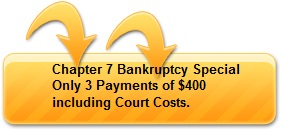
Chicago Chapter 7 Lawyers

![]() Our
Chicago chapter 7 lawyers have filed over 8000 chapter 7 and chapter 13
bankruptcy cases for honest, hardworking people in need of a financial fresh
start. We have 4 Conveniently located offices. Our phones are answered by bankruptcy attorneys, not support staff.
Over 60% of our clients are referred to us by satisfied friends and family
members. Many of our Chicago bankruptcy lawyers have been speakers at various bankruptcy
continuing legal education classes. Our Lawyers are licensed
by the Illinois bar, United States District Court for the Northern District of Illinois and are members of the National Association of Consumer Bankruptcy Attorneys
and the American Bankruptcy Institute.
Our Better Business Bureau rating is A Plus.
Our
Chicago chapter 7 lawyers have filed over 8000 chapter 7 and chapter 13
bankruptcy cases for honest, hardworking people in need of a financial fresh
start. We have 4 Conveniently located offices. Our phones are answered by bankruptcy attorneys, not support staff.
Over 60% of our clients are referred to us by satisfied friends and family
members. Many of our Chicago bankruptcy lawyers have been speakers at various bankruptcy
continuing legal education classes. Our Lawyers are licensed
by the Illinois bar, United States District Court for the Northern District of Illinois and are members of the National Association of Consumer Bankruptcy Attorneys
and the American Bankruptcy Institute.
Our Better Business Bureau rating is A Plus.


How Chapter 7 bankruptcy works.
In Chapter 7 bankruptcy, the United States Bankruptcy Court cancels or
forigives many
or all of your debts. In theory it might also sell some of your property
to pay your creditors (However, 99% of cases are no asset cases where
people keep all their property. Chapter 7 bankruptcy, also called
"straight" bankruptcy, is named because the law is found in Chapter 7 of
the U.S. Bankruptcy Code.
Chapter 7 Bankruptcy Cost and Timeframe
The whole Chapter 7 bankruptcy process typically takes about 3 1/2 to
four months. We file a bankruptcy "petition" for you with the
federal bankruptcy court. Upon filing of your case, the bankruptcy
court notifies your creditors of your protected status. About 30
days after filing your lawyer attends a bankruptcy hearing with you
called a "341 meeting of creditors. It is very rare that any creditors show up for the hearing. A hearing officer reviews your
paperwork with us. About 60 days after the hearing you receive
"discharge papers" forgiving your dischargeable debts. The costs are
$901.00 in attorneys fees we charge as well as $299 in court costs.
We typically break this $1200 down into 3 payments of $400.00 for a
chicago bankruptcy case.
creditors show up for the hearing. A hearing officer reviews your
paperwork with us. About 60 days after the hearing you receive
"discharge papers" forgiving your dischargeable debts. The costs are
$901.00 in attorneys fees we charge as well as $299 in court costs.
We typically break this $1200 down into 3 payments of $400.00 for a
chicago bankruptcy case.
You must also complete 2 credit counseling classes with an agency
approved by the United States Trustee. One class before filing and one
class after filing. The classes are given over the phone or
internet and the charge a small fee of approximately $25-$35.
Who Can File
You won't be able to use Chapter 7 bankruptcy if you already received a chapter 7 bankruptcy discharge in the last eight years, or if, based on your income, expenses, and amount of debt, you make too much to file.
Bankruptcy Forms filed in a chapter 7 bankruptcy case
We gather your financial history from you to fill out a petition and a number of other forms and file them electronically with the bankruptcy court. Basically, the forms ask you to list your property, your current income and monthly living expenses, your debts, property you claim the law allows you to keep through the Chapter 7 bankruptcy process ( "exempt property") --Illinois lets you keep some equity in your home, clothing, most household furnishings, Social Security payments you haven't spent, and other necessities such as a car with less than a certain amount of equity-- , property you owned and money you spent during the previous two years, and property you sold or gave away during the previous four years and information on an businesses you owned in the last 6 years.
The Automatic Stay Stops Your Creditors
Filing for Chapter 7
bankruptcy puts into effect an "automatic
stay." The automatic stay immediately stops most creditors from
contacting you or trying to collect what you owe them. So, at least
temporarily, creditors cannot legally "garnish" your wages, take your
bank account, go after your car, house, or other property, or cut off
your lights or gas or welfare benefits.
By filing for Chapter 7 bankruptcy, you are theoretically placing the
property you own and the debts you owe in the hands of the bankruptcy
court. You cannot sell, transfer or give away any of the property you
own when you file, or pay off your pre petition debts, without the
court's approval. However, with a few exceptions such as receiving an
inheritance within 6 months of filing, you can do whatever you want with
property you acquire and income you earn after you file for bankruptcy.
The Chapter 7 Bankruptcy Trustee
In most chapter 7 cases you never see an actual judge. The court
exercises its control through person called a "bankruptcy trustee." The
trustee's primary duty is to see that your creditors are paid as much as
possible on what you owe them. The trustees work on a commission basis
and the more assets the trustee recovers for creditors, the more the
trustee is paid.
The trustee will review your bankruptcy papers to make sure they are
complete and to look for nonexempt property to sell for the benefit of
creditors. The trustee will also look at your financial transactions
during the previous 2 years to see if any can be undone to free up
assets to pay your creditors. (You can't transfer your assets out of
your name and then file bankruptcy. In most
Chapter 7 bankruptcy
cases, the trustee finds nothing of value to sell and files a "No asset
report".
The Creditors Meeting
A week or two after you file, you and all the creditors you list in your
bankruptcy papers will receive a notice that a "341 creditors meeting"
has been scheduled. The bankruptcy trustee runs the meeting and, after
swearing you in, may ask you questions about your bankruptcy and the
papers you filed. In the majority of Chapter 7 bankruptcies, this is the
only hearing you have to attend.
What Happens to Your Property
If, after the creditors meeting, the trustee determines that you have
some nonexempt property, you may be required to either turn over that
property or provide the trustee with its equivalent value in cash. If
the property isn't worth very much or would be cumbersome for the
trustee to sell, the trustee may decline to administer or sell the
property which means that you get to keep it, even though it is not
exempt.
Most property owned by Chapter 7 debtors is either exempt or is
essentially worthless for purposes of raising money for the creditors.
As a result, a majority of debtors get to keep everything they own.
You must still make regular payments on secured debts you are keeping
such as a home or car note.
How Your Secured Debts Are Treated
If you've given collateral for a loan, the loan is called a secured
debt. The most common examples of secured loans are house and automobile
notes. If you're behind on your payments, the creditor can ask the court
to "lift" the automatic stay in order to repossess or foreclose on the
property. If you are up to date on your payments, you can keep the
property and keep making payments as before unless you have enough
equity in the property to require its sale by the trustee.
The Chapter 7 Bankruptcy Discharge
At the end of the bankruptcy process, all of your debts are forgiven (discharged) by the court, except: debts that survive bankruptcy, such as child support, most tax debts, and student loans, parking and traffic tickets, code violations and debts that the court has declared nondischargeable because of fraud. Debts which are typically forgiven include, credit cards, medical debt, repossessions, foreclosures, personal loans, payday loans
chilawyers.com provider of chicago chapter 7 lawyers
We are a debt relief agency. We help people file for bankruptcy relief under the Bankruptcy Code.
Copyright 2002-2011 Gleason and Gleason LLC
![]()